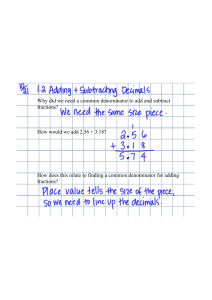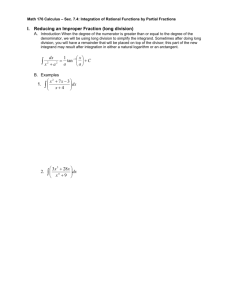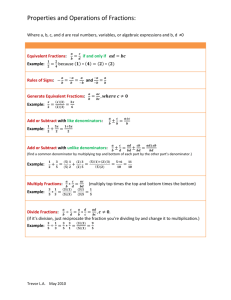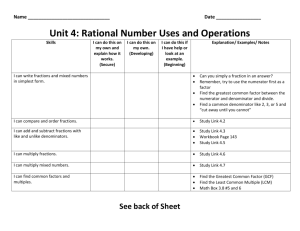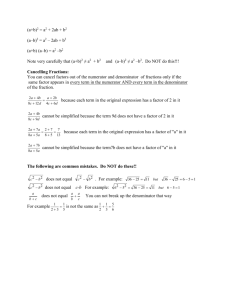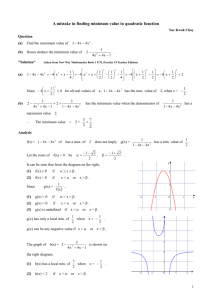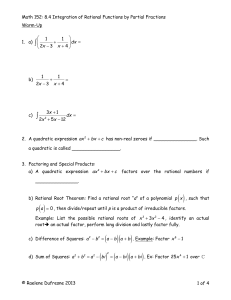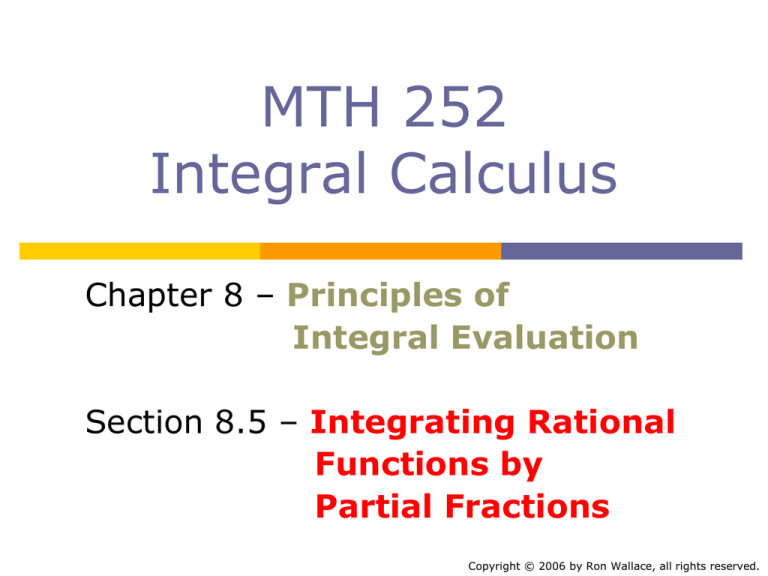
MTH 252
Integral Calculus
Chapter 8 – Principles of
Integral Evaluation
Section 8.5 – Integrating Rational
Functions by
Partial Fractions
Copyright © 2006 by Ron Wallace, all rights reserved.
Review:
Addition/Subtraction of Fractions
a c ad bc
b d
bd
Note: The equation works both ways!
Problem:
Find two fractions whose sum/difference
is equal to a third given fraction.
The product of the denominators of the
two fractions will be the denominator of
the given fraction.
Example:
ad bc a c
bd
b d
Find two fractions whose
sum or difference is:
11
35
Denominator = 35
Possibilities for the other two denominators are:
1 & 35 and 5 & 7
11 A B
35 5 7
11 7 A 5B
Many solutions, including:
3 & -2 and 1 & 4/5
Rational Functions
Any function of the form,
P( x )
f ( x)
Q( x)
where
P( x ) and Q ( x )
are polynomials.
Fundamental Theorem of Algebra
Every polynomial equation of degree n
with complex coefficients has n roots in
the complex numbers.
Each real root r, gives a factor (x-r).
Each complex root +i has a companion root
-i. These give a factor: (ax2+bx+c).
Hence, every polynomial can be written as
a product of linear & quadratic factors.
Some “Easy” Integrals
of Rational Functions
5
dx 5ln x 3 c
x3
5
2 x 3 dx
Linear
Denominator
5 1
5
du ln 2 x 3 c
2 u
2
Let u=2x-3
du=2dx
4x
12
dx 4
dx 4 x 12 ln x 3 c
x3
x3
17
4x 5
x 3 dx 4 x 3 dx 4 x 17 ln x 3 c
5
(2 x 3)7 dx
Let u=2x-3
du=2dx
5
2
1
u 7 du
5
2
7
6
6
5
5
u
du
u
c
(2
x
3)
c
12
12
Partial
Fractions
P( x )
Q( x) dx
where Q(x) is a product
of linear factors &
deg(P(x)) < deg(Q(x))
2x 5
A
B
(3x 1)( x 4)
(3x 1) ( x 4)
2 x 5 A( x 4) B(3x 1) ( A 3B) x (4 A B)
2 A 3B
5 4 A B
Solve this system
for A & B.
A=-1, B=1
2x 5
1
1
1
(3x 1)( x 4)dx 3x 1 x 4 dx 3 ln 3x 1 ln x 4 c
This method can be extended to any
number of distinct linear factors.
Partial
Fractions
Repeated
Linear Factors
P( x )
Q( x) dx
4x 1
(2 x 3) 2
where Q(x) is a product
of linear factors &
deg(P(x)) < deg(Q(x))
A
BB
(2 x 3) (2 x 3) 2
4 x 1 A(2 x 3) B 2 Ax (3 A B)
4 2A
1 3 A B
Solve this system
for A & B.
A=2, B=-7
4x 1
2
7
7
(2 x 3)2 dx 2 x 3 (2 x 3)2 dx ln 2 x 3 2(2 x 3) c
This method can be extended to any power of the denominator
and can be combined with the previous method.
More “Easy” Integrals
of Rational Functions
Quadratic
Denominator
3
1
dx 3
dx
2
2
x 4x 7
( x 2) 3
1
3 2
du
u 3
Let u=x-2
du=dx
Finish using trig substitutions.
3
2x 4
17
3 x 11
x 2 4 x 7 dx 2 x 2 4 x 7 dx x 2 4 x 7 dx
3
2
6 11
3x 11 _____(2
x 4) _____
d 2
x 4 x 7
dx
Just like the
one above!
3
2
ln x 2 4 x 7
More “Easy” Integrals
of Rational Functions
Quadratic
Denominator
3
2x 4
17
3x 11
dx
dx
dx
2
5
2
5
2
5
( x 4 x 7)
2 ( x 4 x 7)
( x 4 x 7)
Complete the
square & trig
substitution.
Let u = x2 - 4x + 7
du = 2x – 4 dx
3 5
3 4
u
du
u c
2
8
3 2
( x 4 x 7) 4 c
8
Partial
P( x )
dx
Fractions Q( x)
4 x2 x 3
( x 1)( x 2 2 x 3)
where Q(x) is a product of a
linear factor & a quadratic
factor & deg(P(x)) < deg(Q(x))
A
BxB C
2
( x 1) ( x 2 x 3)
4 x 2 x 3 ( A B) x 2 (2 A B C ) x (3 A C )
4 A B
1 2 A B C
3 3A C
Solve this system
for A, B, & C.
A=1, B=3, C=0
4 x 2 3x 3
1
3x
dx
dx
( x 1)( x2 2x 3) x 1 x2 2x 3 dx
This method can be extended to any
number of distinct linear & quadratic factors.
Partial
Fractions
Repeated
Quadratic Factors
P( x )
Q( x) dx
where Q(x) is a product
of quadratic factors &
deg(P(x)) < deg(Q(x))
P( x)
(3x 2 x 2)2
Ax B
Cx D
2
(3x x 2) (3x 2 x 2)2
… and proceed as before!
All of these methods can be combined and extended to handle
any rational function where you can factor the denominator
into a product of linear and quadratic factors.
Partial
Fractions
Example …
where Q(x) is a product
of quadratic factors &
deg(P(x)) < deg(Q(x))
P( x )
Q( x) dx
x 3x 2 x
( x4 1)( x3 1)( x3 1) dx
5
3
P( x )
Q( x) dx
where deg(P(x)) ≥ deg(Q(x))
Simplify using long division of polynomials.
Example:
4 x 3 3x 5
2 x 1 dx
4
2 x dx xdx dx 2 x 1 dx
2x x 1
2
2
4
2x 1
2 x 1 4 x 3 0 x 2 3x 5
4 x3 2 x2
2 x 2 3x
2x 2 x
2 x 5
2 x 1
4

